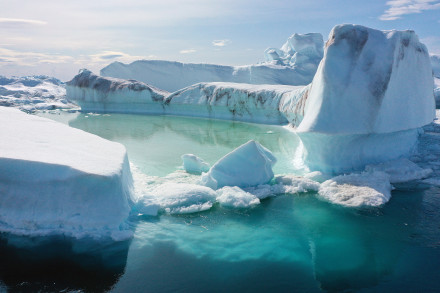
Don’t panic, but a melting ice sheet in Greenland just dumped 197 billion tonnes of water into the ocean. Actually, that’s fucked. We’re all fucked. It’s time to panic.
[jwplayer pEljIPxT]
July 31 marked the biggest melting day since 2012, with 60% of the Greenland ice sheet seeing at least 1mm of melt in the 24hr period. A whopping 10 tonnes of water was dumped into the ocean on Wednesday alone. That’s more than one tonne per person on the planet, aka bad news.
According to Ruth Mottram, a climate researcher with the Danish Meteorological Institute, 197 billion tonnes of water entered the Atlantic Ocean in July alone. This is enough to increase sea levels by at least half a millimetre.
“It looks like the peak will be today. But the long-term forecast is for continuing warm and sunny weather in Greenland, so that means the amount of the ice loss will continue,” Ruth said on July 31.
Ongoing heatwave in #Greenland – 31st July biggest melt day so far – 56% of the #icesheet had at least 1mm of melt at surface and more than 10 billion tonnes of ice was lost to the ocean by surface melt alone
Another big melt day expected todayhttps://t.co/Ftg0fkkwJc pic.twitter.com/Orwdsyesnm
— Greenland (@greenlandicesmb) August 1, 2019
I know, I know, 0.5mm sounds miniscule. We can just ignore it for a few more years, right? Wrong. Let me explain.
According to the Danish Meteorological Institute, one billion tonnes (bear in mind, we’re talking about 197 billion tonnes) of ice roughly equates to 400,000 Olympic-sized swimming pools worth of water. So I hope you all learned to swim.
Greenland is the world’s largest island, and is 82% covered by ice. The spectacular island is already the world’s biggest contributor to rising sea levels, but it appears the European heatwave has decided to wreak havoc on the icy country.
“Over the last couple of days, you could see the warm wave passing over Greenland,” Ruth said. “That peak of warm air has passed over the summit of the ice sheet, but the clear skies are almost as important, or maybe even more important, for the total melt of the ice sheet.”
So what exactly does this rise in sea levels mean?
Essentially, that 197 billion tonnes of fresh water will sit on the ocean’s surface because its lighter than the salt water. This can have adverse effects on air circulation, can increase rainfall and can cause extreme weather patterns like heat waves and intense storms.
Not good. Not good at all.
Ruth Mottram also added that clear skies are likely to continue in Greenland “so we can still get a lot of ice melt even if the temperature is not spectacularly high.”
The “defrosting season” in Greenland will continue until the end of the month, so these figures are likely to rise before summer is over, according to Mottram’s research.
With all of this talk of rising sea levels, climate change activists are calling for action to be taken in Greenland before it is too late.



